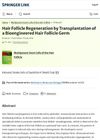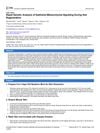 19 citations,
June 2021 in “Tissue Engineering and Regenerative Medicine”
19 citations,
June 2021 in “Tissue Engineering and Regenerative Medicine” Fat stem cell particles help regrow hair.
 19 citations,
December 2018 in “Experimental and Molecular Medicine”
19 citations,
December 2018 in “Experimental and Molecular Medicine” Small molecule IM boosts hair growth by changing stem cell metabolism.
 18 citations,
November 2020 in “Frontiers in Cell and Developmental Biology”
18 citations,
November 2020 in “Frontiers in Cell and Developmental Biology” Inflammation plays a key role in activating skin stem cells for hair growth and wound healing, but more research is needed to understand how it directs cell behavior.
15 citations,
March 2022 in “Acta Biomaterialia” The new 3D bioprinting method successfully regenerated hair follicles and shows promise for treating hair loss.
 14 citations,
July 2019 in “Experimental and Molecular Medicine”
14 citations,
July 2019 in “Experimental and Molecular Medicine” Nanog gene boosts stem cells, helps hair growth, and may treat hair loss.
13 citations,
December 2021 in “Wound repair and regeneration” Photobiomodulation helps hair regrow in injured skin by aiding cell movement and secretion.
 13 citations,
December 2014 in “Stem Cells”
13 citations,
December 2014 in “Stem Cells” Hair and skin can regenerate without bulge stem cells due to other compensating cells.
12 citations,
April 2022 in “Journal of cosmetic dermatology” Exosome therapy could help with hair loss, but more research is needed to confirm its safety and effectiveness.
 12 citations,
October 2021 in “Cells”
12 citations,
October 2021 in “Cells” Targeting a protein that blocks hair growth with microRNAs could lead to new hair loss treatments, but more research is needed.
 12 citations,
January 2021 in “Cell Transplantation”
12 citations,
January 2021 in “Cell Transplantation” Baby teeth stem cells can help grow hair in mice.
 11 citations,
February 2021 in “Biomedicines”
11 citations,
February 2021 in “Biomedicines” Bacteria in our hair can affect its health and growth, and studying these bacteria could help us understand hair diseases better.
 10 citations,
November 2022 in “Protein & Cell”
10 citations,
November 2022 in “Protein & Cell” Quercetin significantly helps hair growth by activating hair follicles and improving blood vessel formation around them.
9 citations,
August 2019 in “Journal of the American Academy of Dermatology” Exosomes from stem cells may help treat hair loss.
 7 citations,
February 2023 in “Inflammation and Regeneration”
7 citations,
February 2023 in “Inflammation and Regeneration” The protein interleukin-1 alpha helps regenerate hair follicles and increase stem cell growth in mice.
 7 citations,
January 2023 in “Biofabrication”
7 citations,
January 2023 in “Biofabrication” A new method efficiently creates cell spheres that help regenerate hair.
 7 citations,
January 2013 in “BioMed research international”
7 citations,
January 2013 in “BioMed research international” Hair follicles and deer antlers regenerate similarly through stem cells and are influenced by hormones and growth factors.
 6 citations,
April 2020 in “Applied sciences”
6 citations,
April 2020 in “Applied sciences” Hair growth medium helps heal wounds and regrow hair in mice.
 6 citations,
January 2016 in “Methods in molecular biology”
6 citations,
January 2016 in “Methods in molecular biology” Scientists have developed a new method using stem cells to grow and transplant hair follicles, which could be useful for hair regeneration treatments.
 6 citations,
February 2013 in “Journal of Visualized Experiments”
6 citations,
February 2013 in “Journal of Visualized Experiments” The method quickly analyzes hair growth genes and shows that blocking Smo in skin cells stops hair growth.
5 citations,
March 2022 in “Frontiers in Cell and Developmental Biology” Colostrum-derived exosomes can promote hair growth and may be a promising treatment for hair loss.
 5 citations,
April 2022 in “Frontiers in Medicine”
5 citations,
April 2022 in “Frontiers in Medicine” Hair and skin healing involve complex cell interactions controlled by specific molecules and pathways, and hair follicle cells can help repair skin wounds.
 4 citations,
October 2022 in “Frontiers in public health”
4 citations,
October 2022 in “Frontiers in public health” Cadmium chloride pollution can cause skin disorders, speed up aging, and prevent hair growth.
4 citations,
June 2021 in “Frontiers in Pharmacology” Bone marrow stem cells and their medium help hair regrowth.
 4 citations,
August 2020 in “Applied Materials Today”
4 citations,
August 2020 in “Applied Materials Today” Hydrogel microcapsules help create cells that boost hair growth.
 3 citations,
January 2023 in “Materials horizons”
3 citations,
January 2023 in “Materials horizons” The new biomaterial helps grow blood vessels and hair for skin repair.
 3 citations,
April 2021 in “Biomolecules & Therapeutics”
3 citations,
April 2021 in “Biomolecules & Therapeutics” The protein ER71/ETV2 helps regrow hair after chemotherapy by improving the growth of new blood vessels.
 3 citations,
May 2018 in “InTech eBooks”
3 citations,
May 2018 in “InTech eBooks” Animal models, especially mice, are essential for advancing hair loss research and treatment.
 3 citations,
May 2018 in “Biochemical and Biophysical Research Communications”
3 citations,
May 2018 in “Biochemical and Biophysical Research Communications” iNOS contributes to hair loss in obese diabetic mice and blocking it may encourage hair growth.
3 citations,
January 2022 in “Neurotoxicity Research” Botulinum toxin may help reduce stress-related hair loss.
 2 citations,
August 2024 in “International Journal of Dermatology”
2 citations,
August 2024 in “International Journal of Dermatology” Adipose stem cell-derived exosomes are safe and effective for hair regrowth in AGA patients.























